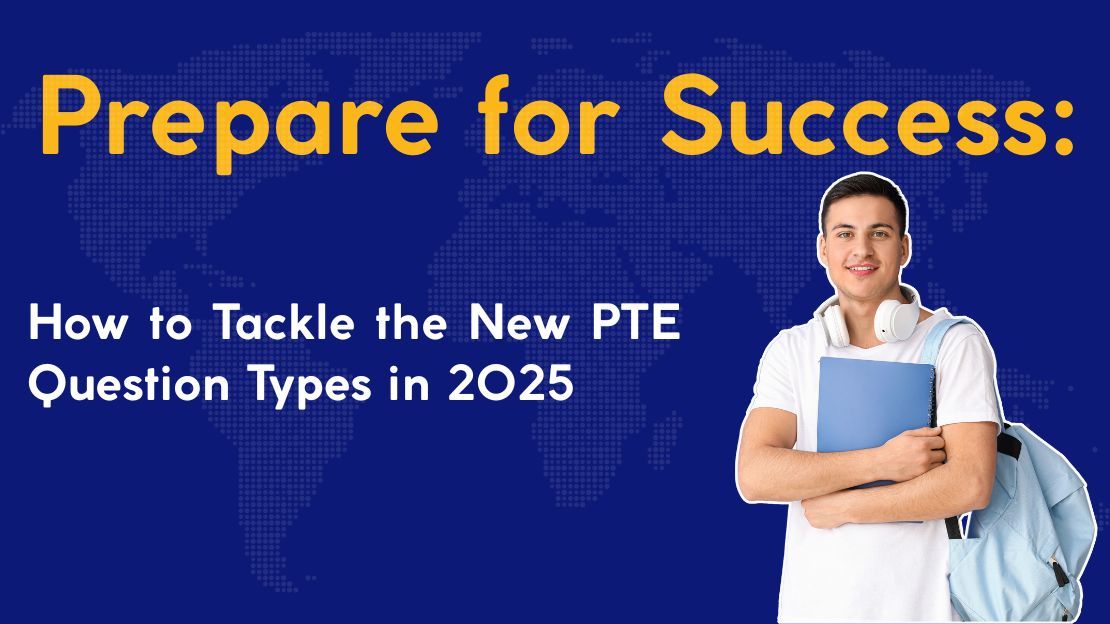Prepare for Success: How to Tackle the New PTE Question Types in 2025

If you're preparing for the PTE Academic exam after August 7th, 2025, there's an important update you should know about. Pearson has introduced New PTE Question Types in the Speaking section, which are designed to test your real-world communication skills—not just how well you memorize English grammar rules. These changes reflect how English is used in everyday academic and social settings, making the exam more practical and engaging. In this blog, we’ll walk you through what’s changing, why it matters, and how to prepare with confidence.
🆕 What’s New in the Speaking Section?
The Speaking section now includes two New PTE Question Types:
Summarize Group Discussion
Respond to a Situation
These tasks are more realistic and conversational. You’ll be asked to listen, process information, and respond in your own words—just like you would in a classroom, at work, or in day-to-day life.
🎯 Why Pearson Made These Changes
The goal behind these updates is to make the PTE exam more reflective of real-life English use. Here’s what they focus on:
Spontaneous thinking and speaking
Structured and natural communication
Real-world academic or workplace settings
Less memorization, more practical usage
These changes will benefit test-takers who are confident in their communication skills and prefer real interaction over repetitive drills.
🗣️ A Closer Look at the New Tasks
1. Summarize Group Discussion
What Happens:
You’ll hear a 2–3 minute conversation among 3–4 speakers on a topic
You have 10 seconds to prepare
Then, you’ll speak for 2 minutes to summarize what was discussed
How to Respond:
Focus on what each speaker says, including their main opinions
Use formal, clear language: “The discussion highlighted…” or “One speaker mentioned…”
Cover both sides if there’s disagreement
End with a balanced summary: “In conclusion, the speakers shared multiple views on the issue.”
Important: Avoid giving your own opinion. Keep your tone formal and neutral.
2. Respond to a Situation
What Happens:
You’ll listen to a short real-life scenario (20–30 seconds)
Get 10 seconds to prepare
Respond as if you’re in the situation—your reply should last about 40 seconds
How to Respond:
Start with understanding: “I understand how that could be frustrating…”
Offer one clear, polite solution
End with something helpful like: “Let me know if there’s anything else I can assist with.”
Tip: Be natural, polite, and solution-focused. Avoid sounding rehearsed.
📌 Quick Format Summary (No Tables)
Summarize Group Discussion
Listen: 2–3 minutes
Prepare: 10 seconds
Speak: 2 minutes
Task: Summarize all speakers’ views in a formal, objective way
Respond to a Situation
Listen: 20–30 seconds
Prepare: 10 seconds
Speak: 40 seconds
Task: Respond calmly and clearly, just like in a real conversation
📚 How to Prepare for the New PTE Question Types
1. Train Your Listening Skills
Watch group discussions or panel talks
Focus on who says what, and how they say it
Summarize each conversation out loud to practice
2. Build Fluency and Confidence
Repeat after native speakers from YouTube or podcasts
Practice speaking at a natural pace without hesitation
Reduce filler words like “um,” “like,” or “you know”
3. Practice Real-Life Conversations
Imagine everyday scenarios—like returning an item or helping a classmate
Use polite and professional phrases
Practice responses with a tutor, partner, or even by recording yourself
4. Use Helpful Language Structures
For Group Discussions:
“The discussion focused on…”
“One participant raised the issue of…”
“There were different perspectives on…”
For Situations:
“Thank you for reaching out.”
“Here’s what I can do to help…”
“Would you like me to look into that for you?”
✅ Tips to Do Well on the New Tasks
Practice speaking after 10 seconds of prep—get used to short planning time
Keep your answers simple, clear, and on-topic
Be formal in summaries, and friendly but professional in situations
Record your practice responses and listen for improvements
Focus on communication, not perfection
❌ Common Mistakes to Avoid
Speaking too fast or mumbling
Using informal or slang words
Giving your own opinion during summary tasks
Talking off-topic due to nervousness
Not paying attention to the tone or purpose of the task
🧠 Final Thoughts
The New PTE Question Types added in August 2025 are designed to bring the PTE Academic exam closer to how English is really used in life. These tasks aren’t meant to trip you up—they’re meant to give you a fair chance to show your true communication skills.
With the right preparation, you’ll not only feel more confident during the test—you’ll also become a better English speaker in the real world. Focus on clarity, structure, and staying calm under pressure, and you'll be well on your way to your dream score.
Source: Angel EduNext
